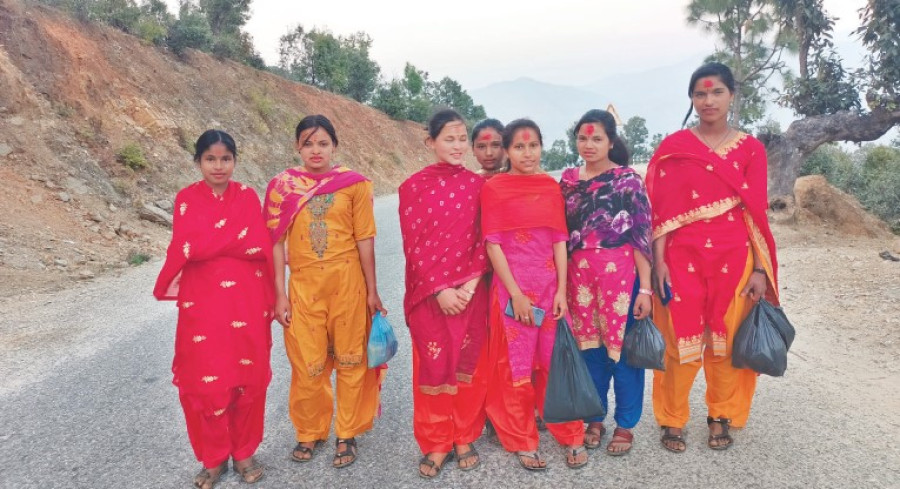Sudurpaschim Province
Many Achham parents favour boys over girls for schooling
Parents don’t put much effort into educating their daughters since they think that girls will someday leave them and go with their husbands.
Menuka Dhungana
Kamala Jaigadi, a 14-year-old girl from Jaidhan settlement in Mangalsen Municipality-1, has never stepped inside a classroom. Children from Jaidhan have to walk for two hours to reach the nearest school and Kamala says she’s willing to take on the hardship. But she has the responsibility of taking care of the household with her sister while her two brothers go to school.
“My parents say they can’t afford to send all four of us to school so they send my brothers to school and my sister and I stay home to help with household chores,” said Kamala. “There are several girls like me in the settlement who want to go to school, but due to financial weakness and a lack of awareness about the importance of education among our parents, we are deprived of an education.”
Kamala wants to go to school to learn to read and write but her education is not in her parents’ priority.
A majority of girls in Jaidhan settlement do not go to school. The parents ensure they provide their sons with an education but do not see the same need apply to their daughters. The girls are mainly involved in housework and often get married at an early age so the number of girls in the settlement is also very low, Kamala says.
According to Baluram Jaigadi, a 55-year-old man from Jaidhan, due to the harsh geographical conditions, earning a livelihood in the villages is hard. Residents of Jaidhan are deprived of education, electricity, clean drinking water, and medical assistance, even though it falls within the jurisdiction of Mangalsen municipality.
Jaidhan is a settlement of 35 Dalit households and 15 non-Dalits. There are around 100 boys and girls of school-going age and more than 35 girls don’t go to school, according to Baluram. Most of the boys are enrolled in school, but nearly none of the girls are.
Most young people from this settlement go to India for employment, Baluram said. “There are mostly elderly and children in most households so the daughters of the house take care of the household. Due to the lack of facilities in the area, almost everyone works in the fields including children.”
Rekha Jaigadi, a 16-year-old girl from the same settlement, also wanted to go to school but cannot because there is no one in her house to do the chores.
According to Rekha, whose parents are working in India, her day starts early in the morning and is spent doing daily chores, collecting firewood and hay for the cattle.
“Earlier, a young boy’s aim would be to go to India in search of jobs while a young girl was expected to take care of the household,” said Rekha. “These days, boys don’t go to India and are instead sent to school. But girls are still stuck at home. Except for a couple of parents, no one is interested in educating their girl children.”
There are only one or two girls in Jaidhan who can read and understand the alphabet; the rest are illiterate, says Rupsi Jaigadi, a 56-year-old local woman.
“The parents’ financial restrictions, the lack of schools close by and the lack of awareness about the importance of educating girls are the main reasons that girls in this settlement are deprived of an education,” said Rupsi. “Back in the day when my kids were of school-going age, none of us knew the importance of education. Now some people send their sons to school by renting rooms near the school area or sending them to live with relatives, but sending daughters to school is not prioritised.”
She further said that the locals don’t put much effort into educating their daughters since they think that girls will someday leave them and go with their husbands.
“People think that girls will get married and leave, so no point in spending money and effort in educating them,” Rupsi said. “The local government must step up and initiate education programmes for girls in the village. Otherwise, girls will forever be left behind.”
But Mangalsen Municipality does not have any plans to provide alternatives to those who missed the enrollment campaign. “As of now, we don’t have any specific programmes to bring girls to school,” Khakendra Sodari, chief administrative officer of Mangalsen Municipality, admitted. “But we plan to collect data on how many children of school-going age are deprived of education, and try to solve this problem.”




 13.12°C Kathmandu
13.12°C Kathmandu















